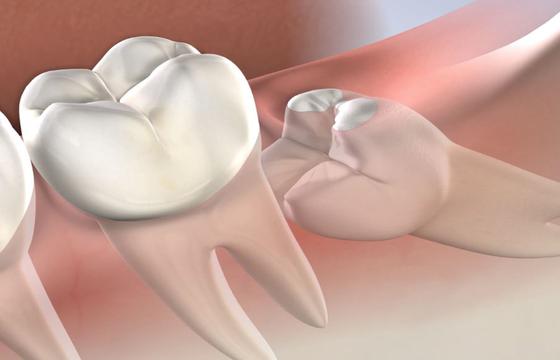Wisdom Teeth Removal
Wisdom teeth removal is often necessary as these teeth can overcrowd the mouth, causing other teeth to shift out of position. Delayed eruption and the small amount of oral space that is accessible, they frequently cause issues. The final pair of molars that erupt in a human mouth, sometimes referred to as third molars.

What is Wisdom Teeth Removal
Although the exact time varies from person to person, they normally manifest in late adolescence or early adulthood, usually between the ages of 17 and 25. Same purpose as other molars, to chew and crush food. Teeth can grow in at an angle, become impacted (unable to fully emerge from the gums), or crowd and misalign other teeth. Each of the four wisdom teeth that most people have is situated in the upper left, upper right, lower left, and lower right quadrants of the mouth. Some people, on the other hand, could have none or very few wisdom teeth. Extractions can assist keep neighboring teeth in normal alignment and minimize crowding.
How long time takes of Wisdom Teeth Removal Process
The number of teeth being extracted, the difficulty of the extraction and the anatomy and medical background of each patient are some of the variables that might affect how long a wisdom tooth extraction surgery takes. The actual process usually takes between thirty and sixty minutes for each tooth.
If several teeth need to be extracted, the complete procedure which includes preparation, extraction and recovery usually takes a few hours.
Process
Preparation involves talking with the patient about the surgery and any available anesthetic alternatives, as well as going over the patient's medical history and getting X-rays to determine the wisdom teeth's location. It might take fifteen to thirty minutes to prepare this.
Anesthetic administration, to make sure the patient is comfortable throughout the extraction process and to numb the region, the patient will be given anesthetic prior to the treatment starting. Depending on the kind of anesthetic used, this process may take several minutes.
Extraction, depending on the tooth's position, whether it is impacted, and the difficulty of the process, the actual extraction of each teeth can take anywhere from 15 to 45 minutes.
Closure, to promote healing and reduce bleeding, the extraction sites may be sutured shut following the removal of the tooth or teeth. Every extraction location usually needs a few minutes for this procedure.
Instructions for recovery and after-treatment, patients are kept under observation in a recovery area until they are stable and conscious following the treatment. Following surgery, the dentist will give post-operative advice on how to take care of the extraction sites and deal with any pain or swelling. This might need fifteen to thirty minutes.
Who needs Wisdom Teeth Removal?
Impaction, frequently suffer from impaction due to a lack of room to properly erupt. May hurt, swell or get infected. Wisdom teeth can lead to crowding in the mouth, which can cause other teeth to become misaligned. Wisdom tooth extractions can assist keep neighboring teeth in normal alignment and minimize crowding.
Infection, partially erupting can leave spaces where germs can grow and cause gum disease and infections. Wisdom tooth extractions can aid in avoiding these diseases and the problems they cause.
Damage to surrounding teeth, can erupt at an angle, pressing on and harming adjoining teeth in the process. It may be possible to protect neighboring teeth by removing.
Tumors or cysts, if left untreated, these conditions can occasionally develop around impacted teeth and cause more severe issues. The development of cysts or tumors may be avoided by the removal.
Risks and Benefits
A typical dental operation advised to address possible issues related to wisdom tooth eruption is the extraction. As with every medical operation, there are advantages and disadvantages to take into account:
Benefits of Extracting
Problem Prevention, by removing, possible issues such impaction, crowding, infection and harm to neighboring teeth can be avoided.
Pain Relief, impacted or incorrectly erupting might result in pain and discomfort. These teeth can be removed to reduce discomfort and enhance dental comfort.
Preventing Infection, partially erupting can leave areas where bacteria can grow and cause gum disease and infections. Extractions can aid in avoiding these diseases and the problems they cause.
Safety of Neighboring Teeth, that erupt at an angle may press up on other teeth, inflicting harm or misalignment. Tooth extractions can shield neighboring teeth from harm.
Better Oral Health, extraction can help to enhance general oral hygiene and health by avoiding or treating any issues related to these teeth.
Extraction Risks
Surgical Risks, bleeding, infection and anesthesia-related adverse reactions are among the risks associated with extraction, just like with any surgical surgery.
Dry Socket, this excruciating condition can occur when a blood clot that develops in the socket following extraction becomes dislodged.
Nerve Injury, there is a chance of suffering either transient or permanent nerve injury, especially to the inferior alveolar nerve, which can cause tingling or numbness in the tongue, chin or lips.
Swelling and soreness, following the extraction of teeth swelling, bruising and soreness are typical, although they normally go away in a few days to a week.
Complications, during or after the surgery, uncommon problems could include infection, severe bleeding or harm to surrounding tissues.
Frequently asked questions about Wisdom Teeth Removal
*The treatment pages provided on this platform are intended for informational purposes only and do not constitute medical or dental advice, diagnosis, or treatment recommendations. The information presented on these pages is not a substitute for professional medical or dental advice from qualified healthcare providers.
*By accessing and using the treatment pages on this platform, you acknowledge and agree to the terms of this disclaimer. If you do not agree with these terms, please refrain from using the treatment pages.